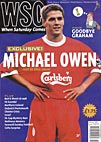 Phil Tanner grinds his teeth over the Welsh FA's hypocrisy and says they may have jeopardised the national team's status
Phil Tanner grinds his teeth over the Welsh FA's hypocrisy and says they may have jeopardised the national team's status
Declaring interests has not been a central theme of Lancaster Gate-gate (or Westgate-gate as it might be termed on the other side of the Severn Bridge), but what the hell. I support a Welsh non-League club which in 1995 had to go to court to establish its right under restraint of trade law not to be forced into the League of Wales. The pillar of the Welsh FA’s defence was that national associations outside the UK were stepping up pressure over the so-called home nations’ independent status and that even minor anomalies such as three clubs, each with a few hundred supporters, playing on both sides of the border might ultimately threaten the existence of the Welsh national side. (For some reason the fact that three much larger clubs did likewise was discounted, but we’ll skip that.)
The judge found no evidence of any such threat. The lawyers said thanks and pocketed several hundred thousand pounds in costs from the FAW. The irony of the FAW accepting funds from Lancaster Gate – invoicing for them, even! – while still preaching against some clubs playing in the structure that at its highest levels generates that money, will not be lost on supporters of Newport AFC and Colwyn Bay.
The sensible view can only be that the men from Westgate Street have acted at least as damagingly to their own interests as the English FA. Maybe even more so. If the cardinal rules are a) don’t offer, solicit or accept improper payments; b) don’t do anything which might lay you open to the charge; c) if you insist, make sure you don’t get caught, then both parties seem equally culpable.
But take it two steps further and add “once you are in a hole, stop digging” and “say it was down to a couple of renegades and hope the other guys maximize the scope for switching a share of the blame in their direction”. Here the FA’s handling of the fall-out seems in a different class. Graham Kelly has gone and Keith Wiseman hung on grimly before accepting the inevitable, but the FAW’s own president cheerfully tells the press that “whatever has been done has been with the full knowledge of the FAW Council”.
The FAW seems to have had more to gain from the deal in that it was guaranteed a result (ie cash), while the allegedly bought-up Welsh vote would not guarantee England the degree of influence they wanted. Initial statements from Cardiff that the payment was nothing to do with the Welsh national side – itself strengthened in recent years by the recruitment of players of English parentage born overseas, in a cynical exploitation of the rules on UK nationality which ought in itself to arouse the suspicion of other FIFA members – do not stand the briefest scrutiny. The FAW was the recipient and the national side is the FAW’s raison d’être.
Even if the money from Lancaster Gate was destined for other parts of the game in Wales, using it for that purpose would presumably free other funds for the FAW to use as it pleased. Some of the money was said to be earmarked for ground improvements, but I somehow doubt Newport and Colwyn Bay were among the intended recipients.
We are all now supposed to be appalled that the “home nations” stand to lose their right to one FIFA vice-presidency between them, but, looked at from outside, they deserve to. Why should one group of four supposedly independent members have this voting privilege? Because they always have? That kind of argument belongs with those deepest-dyed reactionaries campaigning to keep hereditary peers’ voting rights. Losing the FIFA post should be the least of the UK nations’ worries. Having amalgamated their interests and finances so publicly, the FA and the FAW cannot complain if they now come under pressure to finish the job and amalgamate their teams.
From WSC 144 February 1999. What was happening this month